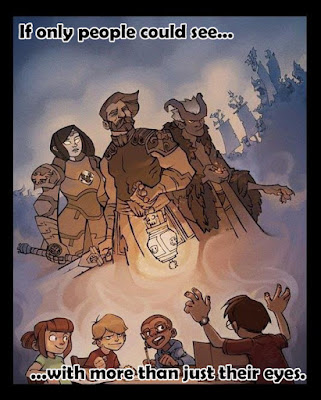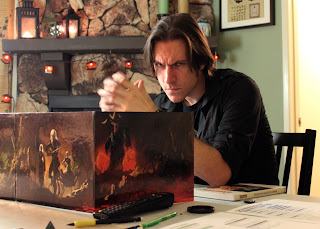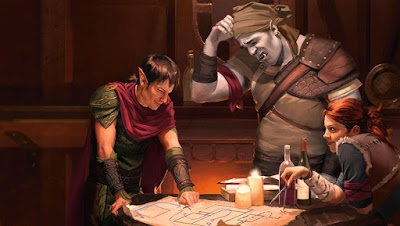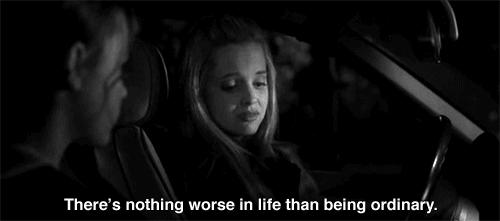A Christian's Case for Dungeons & Dragons
 *Read all bold lettering in a dark, menacing voice; it will make for a much more enjoyable experience!*
*Read all bold lettering in a dark, menacing voice; it will make for a much more enjoyable experience!*
However, during the 43 years that Dungeons and Dragons has budded and flourished, there have been a lot of misconceptions about the game--granted a select few perhaps may be warranted, but what activity doesn't? With Dungeons & Dragons 5th Edition, the game has started to gain a lot of attention. Hit web shows like "Critical Role" or "Dice, Camera, Action" have brought a newfound attention to the game. To add to that, with resources on the internet, we can grab a ton of information for free (such as Pathfinder's online SRD), and can now even play the game in online environments with virtual tabletops such as Roll20. The game is more accessible than ever, and if you notice your child using these keywords in conversation or on their internet searches, then your first reaction might be one that can be described as alarm. Perhaps you've heard that the game invites Satan into your home, that playing this game is devil-worship. Maybe you've heard that the game invites corruption in your children's minds, or encourages them to do evil things in real life. I am here to say that this is true.
Provisionally.
Dungeons & Dragons has been known to create this type of atmosphere. It is an utter rarity, but it has happened. Just as a very small portion of every extracurricular activity have obsessively committed some terrible act in its honor. A child died by diving into a sandbox because he saw Naruto do it on TV. Stupid teenagers have killed each other by simulating Mortal Kombat fighting moves. Radical members of any given religion kill others to progress their twisted beliefs (which I don't infer would be every member of any particular religion, by the way; I'm using this example purely as an example and not making any political statements). More recently, I saw a news article about two dedicated gamers and best friends in Russia getting into an argument over which computer part was better for their gaming computers and the argument escalated into one murdering the other--over a stupid argument people have daily on the internet. You might be thinking, "Jake, I thought you were trying to make a case for Dungeons & Dragons, not against it!" I am. And to drive my point home I'd like to share a personal experience.
Several years ago, I worked at a Cub Scout camp in Washington for a summer, about an hour away from my home. One of the weekends while I was working there, there was a special Mormon event going on at the camp, where well over a thousand young men and their fathers and leaders were going (including my dad and two of my brothers). Being LDS myself, I was looking forward to volunteering for helping out at this overnight event. I knew the Mormon standards very well, even if I was not myself active at the time, and I felt as though it would be a great missionary opportunity by showing my fellow staff what kind of people we were. So I worked on the ropes course during the first day, thinking that everything was going to go well.
The next morning, my boss woke me up early and asked me to help assess the damage to our property. I was shocked to hear that. Our tree house was in shambles, graffiti was written on walls, the classroom where I taught my Japanese class was ransacked, our kitchen was broken into, overnight the female staff kept getting boys knocking on their cabin doors to ask them out, and we found peach schnapps in one of the bathrooms (for those who don't know, "Mormon" and "alcohol" are two words we never say in the same sentence). I was utterly embarrassed! These were my people, even if I was inactive in the church, and they were setting the opposite example I was thinking they would. Later that day, I was eating lunch in the mess hall with some fellow volunteers. A few of them were badmouthing Mormons, and I just remained sullenly silent. I didn't know how to defend my religion, and I wasn't sure I wanted to at that point. Then, behind me I heard our groundskeeper speak up, nearly making me jump out of my seat and knocking my cold pizza to the floor. "Mormons are easily some of the nicest people I've ever met, and I believe they're some of the best humanity has to offer. You need to understand the rule of 'the bottom 2%'. Every group has a small percentage of people who bring about the worst of their kind. Mormons are no different." I was surprised to hear this normally very silent guy say this, and it really hit me. If there were 1000 people attending this camp, then by his "bottom 2%" rule, that means there were about 20 people who might do exactly what happened.
I have never forgotten this story, and I apply it to any situation where I need to see things in a better perspective than what I'm seeing--in fact, I discussed it with someone at church last week when Quinton L. Cook came to visit our church building; he (my friend, not Elder Cook) said I was generous in saying it was only 2% of the people who missed the obvious and had to be told basic instructions over and over, and we had a good laugh about it. But I largely hold this statistic to be true in many regards--including Dungeons & Dragons.
 |
| Matthew Mercer, the DM for Critical Role. |
So while it is true that the game has the potential to corrupt your child and ensnare them in the shadowy tendrils of a twisted Gygaxian nightmare... there are many aspects of the game that I think our society needs to embrace in 2017! It's not 1974 anymore; there are far worse things your kids can get into on this side of the millennium, and in a way games like D&D can help fight those terrible things if harnessed properly. I once saw a hilarious picture that showed a poster for World of Warcraft at the center (without getting too specific, it's essentially an online D&D game--don't beat me down, WoW fans, I know it's much different!), with a heading that says "Abstinence Programs: $15 a month is a small price to pay to keep your son's virginity." And in a way, this line of thought can be kind of beneficial. Not to the exact extent of the picture I described, but enough that we can use roleplaying games (referred to as RPG's in gamer-lingo) to our advantage when helping our kids grow up in an increasingly-dangerous world.
1.) The Game Has Limitations You Set:
 I want to start with the most important point first. But in order to do that we need to understand what Dungeons & Dragons really is. You have players who create characters set in a high-fantasy setting (a roughly medieval setting, but with magic and mythical creatures), and then interact with the world by making conversing with the characters, interacting with objects, and attacking villainous enemies or fighting terrifying creatures. But these players don't run the game; they are at the mercy of a Dungeon Master (DM for short), who spends time beforehand creating the world that they interact with, adding magical items, enemies, environments to explore, and non-player characters (NPC's) for the players to speak to. The DM gives voice to the world (s)he creates, and is also the final arbiter for the rules if ever a problem were to arise. The DM has the power to say no to customization options and decisions the players make.
I want to start with the most important point first. But in order to do that we need to understand what Dungeons & Dragons really is. You have players who create characters set in a high-fantasy setting (a roughly medieval setting, but with magic and mythical creatures), and then interact with the world by making conversing with the characters, interacting with objects, and attacking villainous enemies or fighting terrifying creatures. But these players don't run the game; they are at the mercy of a Dungeon Master (DM for short), who spends time beforehand creating the world that they interact with, adding magical items, enemies, environments to explore, and non-player characters (NPC's) for the players to speak to. The DM gives voice to the world (s)he creates, and is also the final arbiter for the rules if ever a problem were to arise. The DM has the power to say no to customization options and decisions the players make.
For instance, I do not allow evil characters. Characters in the game have an "alignment", or a philosophical code, ranging from lawful-good (Superman) to chaotic-evil (The Joker). In my games, characters that players make can go no lower than chaotic-neutral (Jack Sparrow), meaning that they do not unnecessarily kill or commit heinous crimes, nor do they commit any act for the betterment of any evil entity. The DM also has the benefit of setting the "movie rating", as it were, or in other words, the overall tone of content that is allowed and/or presented. The game can allow for sexual content or vividly-descriptive gore and salty language. While in some groups that is acceptable, it is not in others. Some of you reading might say, "Hey, my group likes that!" that is totally fine. But Dungeons & Dragons is an all-inclusive game by design. That means if some groups don't want to have that in their games, that's okay! For instance, in the games I run as a DM, I try to keep it G-rated language, G-rated sexual content, and PG-rated violence (but I'm not afraid to turn it up to PG-13 if my players are mature enough). I can set the rules to however I need to in order to keep my players safe from indoctrination or Satan-worship.
I am not afraid to change lore as my group needs it; that's one of the wonderful aspects of this game! I don't have to follow any of the rules in the rulebook, as I am the final judge of said rules in order for my players to have the most fun possible. Perhaps some people reading this are afraid of players worshiping fake gods. I frankly don't see it as the players worshiping other gods. Remember that this is a roleplaying game. Just because the Dwarven Cleric, Riker Hammerhelm is performing the sacred rites of Pelor in an obviously-fictional setting, doesn't mean that Jimmy from bum-frak Nebraska is actually performing those same rites or worshiping this Pelor fellow in any form. Jimmy is not Riker Hammerhelm, even if he takes on his role for a couple hours; once Jimmy leaves the table, he goes back to being Jimmy, just like anyone else who plays any given video game or improv class. But even if you're uncomfortable with that (which is totally fine and I understand), I can just as easily change the lore and mechanics of the game so that there are no gods to worship. With the power I have as DM, I can simply snap my fingers and, like my good buddy Captain Picard always says with his infinite wisdom:
2.) The Game is Social:
This is probably my favorite point in the fact about the game! In video games, you almost-always are socializing by staring at a screen and yelling obscene expletives about some random nobody's mother for teabagging your virtual character as if it's supposed to actually mean something. The strange stigma that people have seems much worse than that, when really it's quite the opposite. We don't sit in a dark basement, wearing cultist robes, chanting strange demonic words from a book, by the light of dimly-lit candles, passing around and sipping from a chalice filled to the brim and dripping with dog blood. That's utter nonsense! Many games run are done in the light of day; at a local hobby store, a vacant school classroom (after school with official permission to do so), the kitchen table of someone's house while mom is cooking dinner 5 feet away, etc. Anyone can join these games, and if it's done in public, many new people come in and out--increasing the odds of meeting someone new and interesting. But perhaps you're worried about that. D&D can be run in a controlled environment too, with people you know and trust to have the same standards as you. D&D night can be a great group date for the youth in a local ward (a responsible adult with those same standards as the DM might be recommended). As I was once a member of the youth in the church myself, I totally understand how the normal activities such as playing sports will leave some people feeling left out; a game like D&D bridges that gap, and the social aspects of the game can create bonds between the people who play together much like (and in some ways, even stronger) than other extracurricular activities. The game doesn't even have to be only for loners with neckbeards. Anyone can play this game and have a good time. And for the record: if you played Star Wars: Knights of the Old Republic or any subsequent title of the same series (including the MMO "The Old Republic"), congratulations! You basically played a Dungeons & Dragons game! Same rules, same rolling mechanics, same basic premise.
It can also be a great way to spend time with the family. I was reading a very good article earlier today about children's mental health being affected by many things--but lack of parental attention being chief among them. It's so common in our society to let the XBox or the television be the babysitter while we're busy at work or doing our own thing. Spending time with our kids is really important. In the article, it suggests that playing a board game is an excellent solution if you don't feel like going outside or into town to do something as a family. I would like to extend that "board game" clause to "tabletop games", which includes Dungeons & Dragons. The game itself is very social. The DM describes a situation that the players are in, and the players make decisions based on those. The DM then gives the consequences of those actions. I'll touch on this more later, but for now I want to drive home the fact that it provides an environment for the characters (and by extension, the players) to talk to and interact with one another. Many laughs, intense moments, and shouts for joy can be had in a positive game of D&D.
And it becomes a great time for parents to come together with their children, leave the stresses and conflict of the home behind, and play a game as a family unit. Roleplaying your character allows your kids to not see you as dad, but as the witty Tiberius Stormwind, Dragonborn Sorcerer who can never seem to remember that fireball spell. You can use props, voice-acting, and dramatic gestures to make your character come alive, and the other players can reciprocate by doing the same thing with their characters in response. The roleplaying has the infinite potential for being uplifting and heart-warming. I cannot stress this enough when I say this: the sky is the limit for the content you can create in this wonderful game. All-in-all, this game can be social in ways you've never thought possible.
3.) The Game Requires Critical Thinking:
 I can't count the number of times I have sat back and said, "Huh... How the heck are we getting out of this one?" when playing Dungeons & Dragons. In addition to working together in a social environment to solve problems, we have to think critically in order to survive some encounters--especially if we've made mistakes (you have no idea how many times I've seen a group split up to cover more ground; it might work for Scooby Doo and friends, but not for games where the DM creates encounters of enemies with the assumption that they would be fighting them as a full party). Sometimes crafty thinking and problem-solving is the only way to get someone out of a sticky situation. I've seen spells get used in such unique ways in order to save a character's life. That's one of the nice things about D&D: it's malleable, not only in game creation like I mentioned before, but in problem-solving. Want to use that magical flying hammer to smack the table the goblin is standing on and send it flying into the rushing ravine? As a DM, I make it a habit to say, "You can certainly try. Make your attack roll." If it's a good roll, I let it happen. So much cool stuff happens in ways you never expect, creating a rich storytelling experience that everyone participates in.
I can't count the number of times I have sat back and said, "Huh... How the heck are we getting out of this one?" when playing Dungeons & Dragons. In addition to working together in a social environment to solve problems, we have to think critically in order to survive some encounters--especially if we've made mistakes (you have no idea how many times I've seen a group split up to cover more ground; it might work for Scooby Doo and friends, but not for games where the DM creates encounters of enemies with the assumption that they would be fighting them as a full party). Sometimes crafty thinking and problem-solving is the only way to get someone out of a sticky situation. I've seen spells get used in such unique ways in order to save a character's life. That's one of the nice things about D&D: it's malleable, not only in game creation like I mentioned before, but in problem-solving. Want to use that magical flying hammer to smack the table the goblin is standing on and send it flying into the rushing ravine? As a DM, I make it a habit to say, "You can certainly try. Make your attack roll." If it's a good roll, I let it happen. So much cool stuff happens in ways you never expect, creating a rich storytelling experience that everyone participates in.
The problem-solving skills in this social setting are much more favorable than letting your kid sit alone at his computer solving problems in a video game by himself or mindlessly hacking and slashing at virtual enemies. With games like D&D, you can create problems for people to solve that promotes critical thought (and sometimes, with a little luck, a critical hit).
 And these problems don't have to be in combat, either. As you can probably tell by now, I'm a massive Star Trek fan. While Star Wars is great, Trek focuses a lot on moral dilemmas and problem-solving through unique strategies and knowledge. Trek is also famous for creating story problems that might apply to dilemmas that are relevant to our time. I sometimes like to model my storytelling in this regard. It allows no shortage of unique situations for my players to solve by negotiation, research, and planning. Unless it conflicts with standards our group has set together, no solution to a problem is off-limits, and the consequences of those solutions may create even bigger problems. D&D allows a large variety of problems to solve that don't require you to just murder-hobo everything that moves. I've seen entire sessions go without seeing a second of combat. Likewise, I've seen nothing but combat happen for several sessions in a row. It's all about how the DM sets up the game and how the players react to it.
And these problems don't have to be in combat, either. As you can probably tell by now, I'm a massive Star Trek fan. While Star Wars is great, Trek focuses a lot on moral dilemmas and problem-solving through unique strategies and knowledge. Trek is also famous for creating story problems that might apply to dilemmas that are relevant to our time. I sometimes like to model my storytelling in this regard. It allows no shortage of unique situations for my players to solve by negotiation, research, and planning. Unless it conflicts with standards our group has set together, no solution to a problem is off-limits, and the consequences of those solutions may create even bigger problems. D&D allows a large variety of problems to solve that don't require you to just murder-hobo everything that moves. I've seen entire sessions go without seeing a second of combat. Likewise, I've seen nothing but combat happen for several sessions in a row. It's all about how the DM sets up the game and how the players react to it.
I hope I have cleared things up a little. I have, for a long time, carried the stigma with me that people think I'm dabbling in demon-worship or Satanism when I mention the words "Dungeons & Dragons". I am tired of having to defend my love for this game. It is fun, just as fun as any video game out there. It has the same potential to bring someone to darkness and evil as Minecraft does (a relatively G-rated game). It is incredibly social and uplifting if you allow it. So the next time it comes up in conversation, don't shy away from it! Consider what this game can bring to you and your family. Break the old and outdated stigma, and embrace what is good and exciting about the game. And remember that many PG-13 movies have greater potential to be even more dangerous to your child than D&D does. It does require you to be a responsible person and follow your standards. I can create a game where there are no false gods to worship, or I can just as easily create a game where my players fight Nazi-zombie hookers from space-hell (please note that this is not an actual monster in the game, I'm just being funny). Remember the rule of the bottom 2%, and you and your friends or family will take the game of Dungeons & Dragons to heights you never dreamed were possible.
Thank you for choosing Taiwanese Takeout!







Comments
Post a Comment